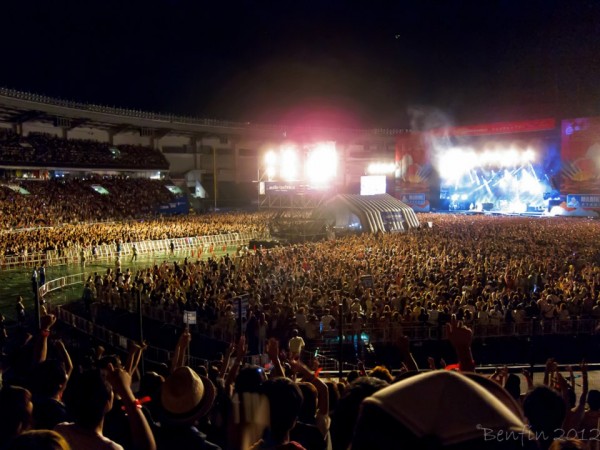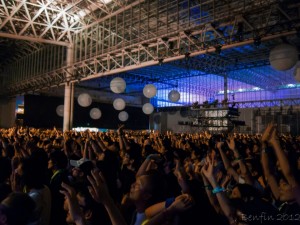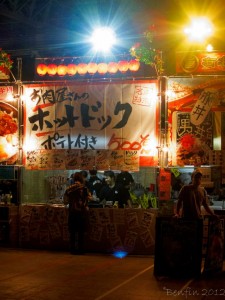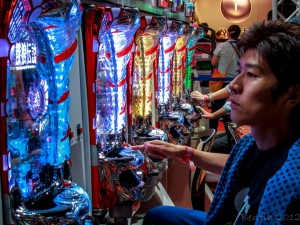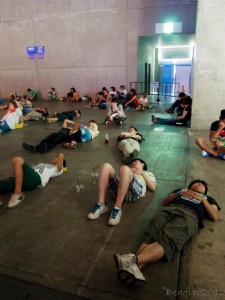Thinking of hitting up one of the Japanese summer mega-festivals this year? Here are a few things you might want to know before springing for a ticket.
The world’s biggest music festivals are massive, global events. If it’s a killer international line-up and an audience the size of a small city that transforms a music festival into a place of pilgrimage, Japan’s gargantuan summer festivals should surely share the mythic status of say, Coachella, Glastonbury or Primavera. Yet non-Japanese travellers who make the trek to Fuji Rock or Summer Sonic won’t find too many fellow foreigners in the mosh pit. Why is it that these two unequivocally enormous events aren’t on every festival fan’s radar? Should they be? What is it that makes a Japanese music festival so unlike any other in the world?
- Everyone is shockingly well behaved
We all know the Japanese are ridiculously polite. You would think though, that the celebratory, free-spirited nature of a music festival would encourage the locals to let their hair down a little. And they do, sort of. There’s fist-pumping and adoring applause aplenty, and when it’s time to dance, there’s dancing. But if you spot anyone running around acting like a shirtless madman, chances are, it’s a foreigner. Miraculously, people refrain from pushing in and barging their way through the crowd, and there’s a genuine respect for personal space. Audience members are even reluctant to leave halfway through a band’s set if they’re not feeling the vibe, because seemingly, that would be impolite.
- You can actually hear the music
Firstly, the sound quality at Summer Sonic kicks serious ass and from all reports Fuji Rock boasts a similar high calibre, despite being largely outdoors. The tickets for these fests are definitely on the pricey side, but at least a good chunk of your hard earned cash goes towards some pretty phenomenal sound gear and stage setups.
Secondly, another plus for super-polite Japanese audiences – they aren’t disposed to having full conversations at the top of their lungs and drunken shouting matches in the middle of the crowd, right when the band is playing your favourite song.
- The line-ups are eclectic, to say the least
The ginormous Summer Sonic festival held in Tokyo and Osaka is by far the largest international music festival in Asia. It offers the best chance for Japanese music fans of all ages and aesthetic persuasions to see a huge number of global acts in one place. So, as distasteful as it might sound to some people, Summer Sonic is a non-discriminatory celebration of music of every kind. There are no limits on genre or perceived coolness, and plenty of room on the phenomenally enormous line-up for local Japanese acts, teenybopper pop stars, aging rockers and the latest indie darlings alike. Avril Lavigne, Megadeth, the Pixies, Azealia Banks, Robert Glasper, Kyary Pamyu Pamyu and a Chinese punk band all on the one line-up? Yes, this has actually happened. No one is going to start a petition to boot Kanye West off next year’s Summer Sonic line-up, guaranteed.
- The food selection is crazy, and awesome
It’s Japan. There’s amazing food everywhere, and festivals are no exception. Unlike the slim pickings at the majority of Australian festivals, in Japan, a vast portion of the festival venue is given over to the food vendors. It’s almost like an entire gourmet market in the middle of a music festival, and the choices are endless. Hot steaming bowls of ramen, curry on rice, fresh grilled yakitori, okonomiyaki and sushi bento boxes? At a festival? You betcha.
- The toilets are clean
Every festival-goer knows that the sensory assault of the portable pee pods is the biggest buzzkill ever. Not so at a Japanese festival. There are actually staff, as in proper, paid cleaning staff, ensuring the toilets remain spotless around the clock. And, having high regard for cleanliness and hygiene instilled in them, people are just less likely to wee all over the floor in Japan.
- Pachinko is everywhere in Japan, even at music festivals
Pachinko, the Japanese version of a slot machine, is so pervasive in Japan that even music festivals can’t escape them. Having rows of gambling machines that turn you into an anti-social zombie, fixated for hours on tiny silver balls while rapidly losing all your money seems counter-intuitive at a music festival, but something’s gotta help pay for the planeloads of bands, amazing stage setups and slick facilities that make these festivals such high quality events.
- Drugs. Nobody is on them.
Whatever your stance on illicit party enhancements, you can’t deny they add an entertaining (and occasionally alarming) element to the atmosphere of a music festival. Blissed out trippers and hyper, bug-eyed raver kids do make for amusing people watching. But in Japan, where even among most young people drugs are deeply taboo, you’re not likely to be greeted by the familiar smell of maryjane wafting through the air, or become the sweat soaked meat in a pill-induced cuddle sandwich. The scarcity of drugs certainly adds to relatively subdued atmosphere of a Japanese festival. If you need to pump yourself full of chemicals to have fun at a festival, the Japanese variety is not for you. Booze however, is very available, and pretty cheap too. Just remember, the sheer scale of a Japanese festival can make it super-exhausting, so observe the relative moderation of most of the locals. If you’re stumbling drunk by midday, you might not make it to the finish line.
Or, you could just find a spare spot somewhere and take a bit of a nanna nap, like these pooped-out punters. Yes, this is normal, and apparently, safe.
- They’re very, very Japanese
The big Japanese festivals may be global events, and they are attracting more and more overseas revellers every year, but in certain ways they do lack the worldwide attraction of the better known festivals in Europe and the US.
If your primary goal is to see to an incredible variety of bands with pristine sound and minimal hassle from drunken bros and inconsiderate dickheads, Fuji Rock and Summer Sonic might be right up your alley. But if you crave the barely controlled chaos that characterises the music festival as we know it, the Japanese ones might be a little tame for your tastes.
While you’ll undoubtedly see a few unhinged antics going on (more often than not from the bands than the audience), the crowds do seem a little held back by their cultural deference to politeness, as well as an assortment of security directives and loudspeaker PSAs about orderly behaviour that basically make you feel like you’re under surveillance by the Japanese Fun Police. Either way, a Japanese festival is a culturally unique experience, a treat for genuine music lovers, and certainly worth any globe-trotting festival connoisseur’s time to check out.

